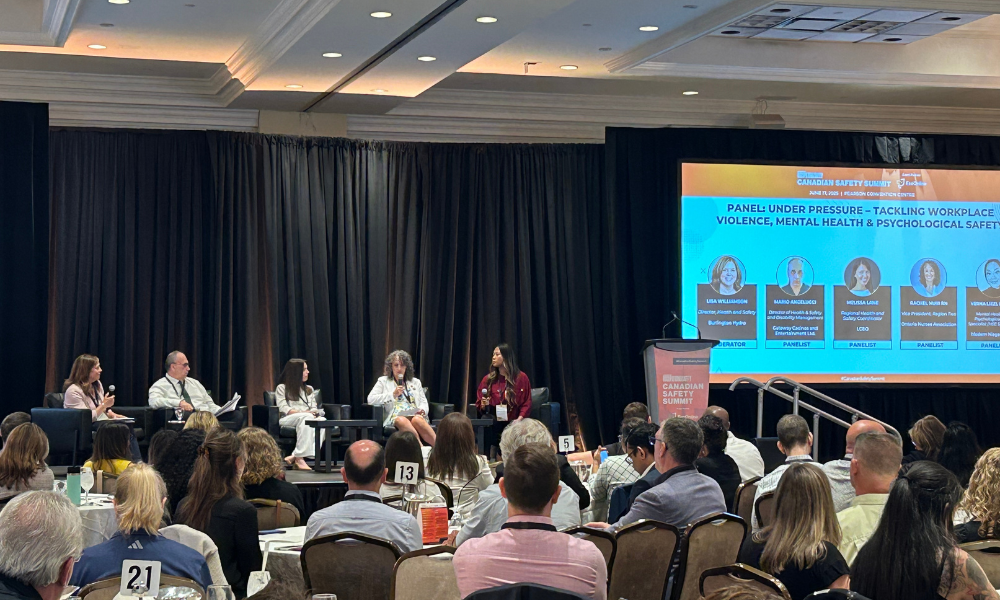Allan Kehler was school president, athlete of the year and national scholarship winner. He was that popular, outgoing high school star who seemed to have it all. But in fact, he was struggling.
“It’s kind of like smiling on the outside, crying on the inside, because forever the world was always my stage and I wore that mask and put on that beautiful smile… but on the inside it was very different,” he says.
In grade 11, mental health issues started to surface. He spent close to the next 10 years meeting with different health professionals who peppered him with various labels and placed him on several prescription medications.
“I was just kind of thrown from one professional to the next,” he says. “It was kind of like Russian roulette; they didn’t know which pills would work.”
In an effort to self regulate, Kehler turned to “self-injurious behaviours,” which eventually evolved into compulsive gambling and drinking.
It was in university that things started to improve, thanks to the actions of one professor. One day after class, Ian McNeill approached Kehler and asked if he wanted to come back to his office to talk. He asked him to sit down and he just said, “How are you doing today, Allan?”
“He had complete compassion and I knew there wasn’t any judgment, and I knew where he was going with that question,” says Kehler. “It was one of the first times I removed my mask and told him a bit about what was going on with my mental heath struggles and substance abuse. He didn’t fix me. He just listened and provided me with some resources. In just 10 minutes, Ian McNeill changed my life.”
Kehler’s story has many valuable lessons for employers, and he regularly speaks at health and safety conferences across Canada.
“Employers have to start understanding this is right under their nose; it’s right in front of us,” says Kehler.
Three-quarters (77 per cent) of drug addicts and 90 per cent of alcoholics are in the workplace, according to the Canadian Centre on Substance Abuse.
According to Kehler, there are six signs to look for that indicate a worker is having issues with mental health or substance abuse: change in appearance; change in performance; dilated or bloodshot pupils; substance-related scents; absenteeism; and isolation.
Oftentimes, people want to approach an individual who appears to be suffering but they don’t know how. They end up doing nothing, which signals to the individual that no one cares.
“One-hundred per cent of people who are challenged by addiction are in pain and they just don’t know how to manage that pain. So, communication. Open up that door and have a conversation,” says Kehler. “We have two basic needs: see me, hear me.”
People often struggle with exactly what to say, but it can just be short and sweet: “I don’t mean to be intrusive, just want to let you know I am concerned. If you need anything, I’m here,” says Kehler.
The individual may initially get mad or just pretend everything is fine.
“But eventually, when they’re ready, in their own time, they will say, ‘I just need to chat.’ And when they get into it, you don’t have to do anything because the moment they open their mouth, it is inevitable that healing will take place,” says Kehler.
At that point, managers should direct the worker to the employee assistance program and any other resources the company may have. Accommodation may also be necessary.
Family members suffer
Employees with a loved one struggling with mental health or substance abuse issues have a hard time at work, too.
“They are renting out the mind space for their loved one, they are maybe not getting sleep because they are worried about their loved one, their performance is going down because they are present in body but not in mind,” says Kehler.
More than one-quarter (26 per cent) of employees have substance abuse or addiction issues in their family, according to Hazelden, an addiction treatment centre with locations across the United States. Of these, nearly one-half say they are distracted and less productive in the workplace because of an addicted family member.
“One woman told me the first time she felt peace in the workplace was when her son was in jail because, finally, she knew where he was and she could finally focus on the task at hand,” says Kehler.
Whether it’s an employee struggling with alcoholism or a mother trying to cope with her daughter’s cocaine use, employers need to address the issue. If they do nothing, the employee’s condition will worsen, co-workers will pick up the slack, the team morale will decrease, productivity will be lowered — which will increase company costs — and safety is at stake, says Kehler.
“It’s not only that individual’s safety, it’s the safety of others around them — and silence is always that enemy. If you say nothing and you play that tape forward and something does happen, are you going to wish you had done something?”
After McNeill had that initial conversation with Kehler in university, Kehler “swallowed his pride” and made some adjustments, such as writing exams in a room by himself and getting note-takers and tutors. He successfully received both his bachelor of education and bachelor of physical education from the University of Alberta.
Now, he lives in Saskatoon with his wife and four kids and teaches a program for people who want to become addictions counsellors at the Saskatchewan Indian Institute of Technology. He is no longer addicted to gambling or alcohol and he has been off prescription pills for his mental health issues for more than six years.
“I wish somebody had said, ‘Just hold on, here is a glimpse of what it could be, you have a home not a house, you have a wonderful wife and children who love you,’” says Kehler. “Sometimes I was just way too blinded by all that darkness. And hope and faith are those two tools that you need to hold on to.”
“It’s kind of like smiling on the outside, crying on the inside, because forever the world was always my stage and I wore that mask and put on that beautiful smile… but on the inside it was very different,” he says.
In grade 11, mental health issues started to surface. He spent close to the next 10 years meeting with different health professionals who peppered him with various labels and placed him on several prescription medications.
“I was just kind of thrown from one professional to the next,” he says. “It was kind of like Russian roulette; they didn’t know which pills would work.”
In an effort to self regulate, Kehler turned to “self-injurious behaviours,” which eventually evolved into compulsive gambling and drinking.
It was in university that things started to improve, thanks to the actions of one professor. One day after class, Ian McNeill approached Kehler and asked if he wanted to come back to his office to talk. He asked him to sit down and he just said, “How are you doing today, Allan?”
“He had complete compassion and I knew there wasn’t any judgment, and I knew where he was going with that question,” says Kehler. “It was one of the first times I removed my mask and told him a bit about what was going on with my mental heath struggles and substance abuse. He didn’t fix me. He just listened and provided me with some resources. In just 10 minutes, Ian McNeill changed my life.”
Kehler’s story has many valuable lessons for employers, and he regularly speaks at health and safety conferences across Canada.
“Employers have to start understanding this is right under their nose; it’s right in front of us,” says Kehler.
Three-quarters (77 per cent) of drug addicts and 90 per cent of alcoholics are in the workplace, according to the Canadian Centre on Substance Abuse.
According to Kehler, there are six signs to look for that indicate a worker is having issues with mental health or substance abuse: change in appearance; change in performance; dilated or bloodshot pupils; substance-related scents; absenteeism; and isolation.
Oftentimes, people want to approach an individual who appears to be suffering but they don’t know how. They end up doing nothing, which signals to the individual that no one cares.
“One-hundred per cent of people who are challenged by addiction are in pain and they just don’t know how to manage that pain. So, communication. Open up that door and have a conversation,” says Kehler. “We have two basic needs: see me, hear me.”
People often struggle with exactly what to say, but it can just be short and sweet: “I don’t mean to be intrusive, just want to let you know I am concerned. If you need anything, I’m here,” says Kehler.
The individual may initially get mad or just pretend everything is fine.
“But eventually, when they’re ready, in their own time, they will say, ‘I just need to chat.’ And when they get into it, you don’t have to do anything because the moment they open their mouth, it is inevitable that healing will take place,” says Kehler.
At that point, managers should direct the worker to the employee assistance program and any other resources the company may have. Accommodation may also be necessary.
Family members suffer
Employees with a loved one struggling with mental health or substance abuse issues have a hard time at work, too.
“They are renting out the mind space for their loved one, they are maybe not getting sleep because they are worried about their loved one, their performance is going down because they are present in body but not in mind,” says Kehler.
More than one-quarter (26 per cent) of employees have substance abuse or addiction issues in their family, according to Hazelden, an addiction treatment centre with locations across the United States. Of these, nearly one-half say they are distracted and less productive in the workplace because of an addicted family member.
“One woman told me the first time she felt peace in the workplace was when her son was in jail because, finally, she knew where he was and she could finally focus on the task at hand,” says Kehler.
Whether it’s an employee struggling with alcoholism or a mother trying to cope with her daughter’s cocaine use, employers need to address the issue. If they do nothing, the employee’s condition will worsen, co-workers will pick up the slack, the team morale will decrease, productivity will be lowered — which will increase company costs — and safety is at stake, says Kehler.
“It’s not only that individual’s safety, it’s the safety of others around them — and silence is always that enemy. If you say nothing and you play that tape forward and something does happen, are you going to wish you had done something?”
After McNeill had that initial conversation with Kehler in university, Kehler “swallowed his pride” and made some adjustments, such as writing exams in a room by himself and getting note-takers and tutors. He successfully received both his bachelor of education and bachelor of physical education from the University of Alberta.
Now, he lives in Saskatoon with his wife and four kids and teaches a program for people who want to become addictions counsellors at the Saskatchewan Indian Institute of Technology. He is no longer addicted to gambling or alcohol and he has been off prescription pills for his mental health issues for more than six years.
“I wish somebody had said, ‘Just hold on, here is a glimpse of what it could be, you have a home not a house, you have a wonderful wife and children who love you,’” says Kehler. “Sometimes I was just way too blinded by all that darkness. And hope and faith are those two tools that you need to hold on to.”





